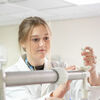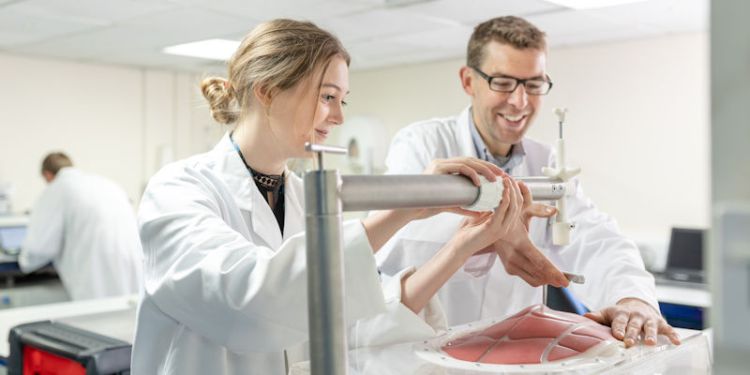
Millie Marriott Webb
- Course: Surgical technologies MRes (Masters by research)
- PhD title: Methods for successful collaborative design of medical devices for LMICs
Millie Marriott Webb is studying an MRes alongside Dr Pete Culmer in the Global Health Research Group (GHRG-ST), within the Surgical Technologies area of research in Mechanical Engineering.
Improving surgical care in low and middle-income countries
Through her research, Millie is looking into ways of designing devices which can both tangibly improve surgical care in low and middle-income countries (LMICs), and can be manufactured, used and maintained using the available resources in a resource-poor setting.
“Kate Raworth’s book ‘Doughnut Economics’ inspired me into thinking of the ways that we as engineers can design things to make the world a better place,” Millie said.
“There’s such a huge amount of medical equipment that gets donated to LMICs and never used – it’s just not designed for that environment. It’s such a waste of effort, funding, time and finite resources.”
She continued: “I want to design a useful surgical device for a rural setting in an LMIC. It needs to be safe and approved by surgeons there, manufactured and maintained in the country from sustainable resources and it needs to make safe surgery more widely accessible.
“We’re currently working on an abdominal wall-lifting device for Gas Insufflation-Less Surgery (GILLS). As I’m working on it I’m investigating practical design methods and strategies for achieving this goal, which I hope will encourage and support others in the future to design other frugal, disruptive medical devices.”
I’m investigating practical design methods and strategies for achieving this goal, which I hope will encourage and support others in the future to design other frugal, disruptive medical devices.
Pursuing a research Masters – an incredible opportunity
Millie was on an integrated Masters course and in my third year when the opportunity to study an MRes appeared.
She said: “I emailed Pete Culmer (my now supervisor) to ask him to let me know if any other opportunities came up for me to get involved. He encouraged me to apply for my current course, and I’m now employed by the GHRG-ST whilst studying towards an MRes part-time.
“It’s an incredible opportunity that has allowed me to focus my studies on something I’m really passionate about earlier than I thought was possible.”
Millie continued: “So far, researching design methods and medical device design, designing and manufacturing prototypes, evaluating prototypes with surgeons and some cadaveric studies.
“We’ve just travelled to India to present our device to surgeons from rural hospitals in the North East and get their feedback and assess how well our device has been aligned to their needs. In the future, it could potentially involve liaising with manufacturers in India and setting up clinical trials there, too.”
In the future, [my research] could potentially involve liaising with manufacturers in India and setting up clinical trials there, too.
Supportive research environment
Postgraduate researchers take part in lectures, workshops and practical sessions, which help to broaden and diversify their skills and knowledge, Millie said.
“The GHRG-ST is fundamental to my work and learning,” she continued.
“I have the support of a wide network of surgeons, engineers, product designers and other clinical researchers.”
It’s an incredible group to work with and enables me to achieve far more than I would have on my own.
Millie also works closely with a product design company called PD-m.
She said “PD-m are fantastic at pushing me to keep things on track and bring a fresh perspective on how to tackle design challenges. We benefit hugely from working with each other and it keeps us on our toes and learning from each other.”
[PD-m and I] benefit hugely from working with each other and it keeps us on our toes and learning from each other.
“My supervisor at Leeds is also fantastic – he’s always at hand to provide fresh ideas and support when needed. While he’s an engineer like me, my second supervisor, Associate Clinical Professor of Surgery Aaron Quyn, is a surgeon who provides a great deal of combined experience for me to lean on.”
My second supervisor is a surgeon, which provides a great deal of combined experience for me to lean on.
She added: “Both of my supervisors are involved in the GHRG-ST and committed to the same goals as I am.”
Career ambitions
Ultimately, following her MRes Millie aspires to further her research as a PhD student. First, she wants to add to her portfolio of experience.
She said: “I would love to do a PhD in a similar research area, but I want to take a few years to broaden my experience working at different companies or institutes first so that I’ll be well-equipped to make the most of it.
“I’m looking forward to doing more of this so much – I’ve never been so happy with what I’m working on.”


